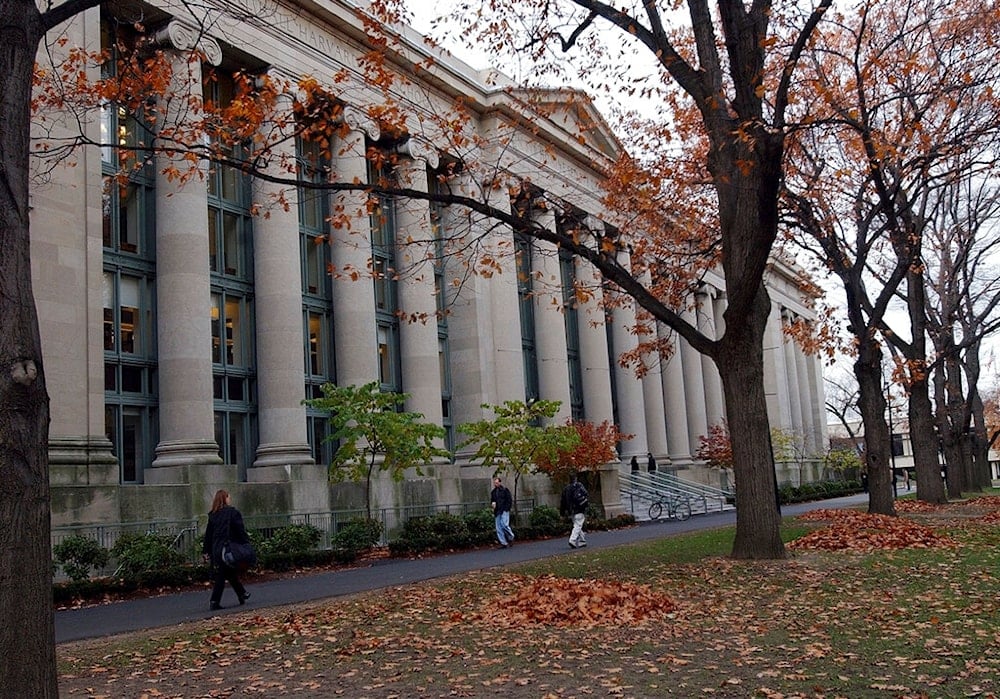Harvard Kennedy School to lay off staff due to funding problems
Harvard Kennedy School is laying off staff on account of the massive federal funding cuts and immigration restrictions imposed by the Trump administration.
-

In this Nov. 19, 2002 file photo, students walk through the Harvard Law School area on the campus of Harvard University in Cambridge, Massachusetts. (AP)
The Harvard Kennedy School of Government is preparing to lay off staff next week as it confronts the fallout of unprecedented federal funding cuts and new restrictions on international student enrollment. The move, first reported by Fox News, stems from mounting financial and political pressure on the university following a series of aggressive actions by the Trump administration.
In a message to faculty and staff, Dean Jeremy Weinstein acknowledged the gravity of the decision. "As a result, we need to lay off some members of our team and restructure other positions to ensure the long-term financial future of the Kennedy School…This is an extremely difficult moment, and one that we did everything possible to avoid," he wrote.
The looming layoffs follow a dramatic step taken on April 15, when the US Department of Education revoked $2.2 billion in federal research grants earmarked for Harvard. The cut was part of a broader freeze affecting institutions tied to diversity, equity, and inclusion (DEI) initiatives, and came amid a campaign against pro-Palestine protests. The White House later escalated the pressure by instructing agencies to terminate an additional $100 million in federal contracts with the university.
In a related move, the Department of Homeland Security announced on May 22 that Harvard would no longer be permitted to enroll new foreign students, and that those currently studying under visas would need to transfer elsewhere. The restriction aligned with a broader effort by the Trump administration to limit foreign academic presence at elite US universities, citing concerns over national security and ideological bias. Harvard immediately filed suit, obtaining a Temporary Restraining Order that blocked the DHS directive.
Further intensifying the standoff, President Donald Trump issued a proclamation on June 4 barring foreign nationals from entering the United States for at least six months if they planned to study at or participate in Harvard-affiliated programs. Harvard again challenged the measure in federal court, and a Massachusetts district judge ruled in the university's favor, suspending the proclamation's implementation.
Academic reckoning
Together, these actions (massive funding withdrawals, contract terminations, and immigration restrictions) have left Harvard, and especially its public policy school, in a state of institutional upheaval. Faculty hiring has stalled, program budgets have been frozen, and international partnerships have been thrown into question.
Though Harvard has prevailed in several legal challenges, the Kennedy School now faces an uncertain future. Its reliance on federal research funding and a globally diverse student body has made it particularly vulnerable to the administration's broader campaign to reshape the landscape of higher education by targeting institutions it accuses of advancing certain agendas.
Read more: University of California faculty sues Trump over funding cuts
Observers warn the impact could extend beyond Harvard, as other research universities reliant on federal support and international talent brace for similar interventions.
In Massachusetts, where Harvard is a major economic driver, state officials and business leaders have voiced concern that the escalating confrontation threatens not only academic freedom but also the regional economy.

 3 Min Read
3 Min Read










